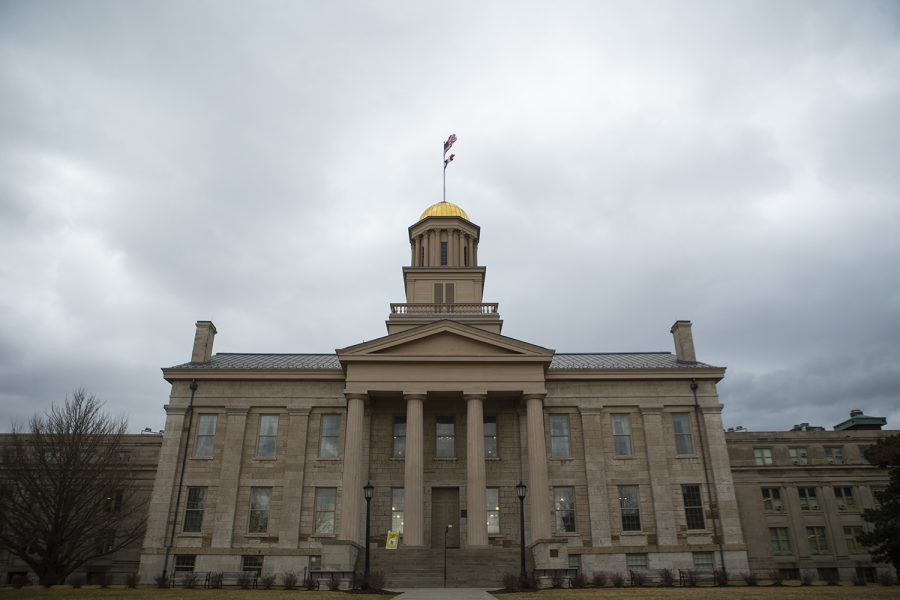University of Iowa students may soon apply for funds from $16 million CARES Act share
U.S. Education Department guidance on CARES Act funding for higher education mandates institutions use half of the funds issued to directly support students. Of the UI’s $16.2 million share, $8.3 million will fund student aid.
The Old Capitol is seen on Thursday, March 12, 2020.
April 28, 2020
University of Iowa students experiencing financial hardship because of COVID-19 may apply for relief using federal funds beginning May 4 on MyUI.
The UI shared Monday that students must articulate how their financial challenges were caused or relate to the pandemic to receive financial support through the UI’s nearly $16.2 million share of the federal Coronavirus Aid, Relief, and Economic Security Act. Around $8.3 million of this aid will be used to assist students directly.
The application method of appropriating funds allows students to express how their financial struggles relate to the COVID-19 pandemic, and federal requirements necessitate that universities report which students receive funds and why, said UI media-relations Director Anne Bassett in an email to The Daily Iowan.
U.S. Education Department guidelines on distributing the funds asked institutions to distribute around half of their aid to cover students’ financial hardships. According to the Office of Student Financial Aid website, financial hardships students face could include circumstances such as a job loss for the student or parent, or health care, technology, or child-care expenses.
The website also states that the factors impacting whether funding is given or not include the submission date of the application, financial need based on the Free Application for Federal Student Aid, use of Federal Direct Stafford loans, and UI GPA. According to the website, priority will be given to students with a GPA over 2.0.
Students who are not eligible for funding include students who aren’t U.S. citizens or permanent residents, those not enrolled in a degree or certificate program, and those enrolled only in online classes at the start of the 2020 semester. U.S. Education Department guidance explicitly bars students who are recipients of Deferred Action for Childhood Arrivals from benefiting from these federal funds.
President Trump in early April signed the CARES Act into law, which provided around $14 billion to colleges and universities. The U.S. Education Department allocated those funds based on institutions’ student enrollment and the share of students who receive the federal Pell Grant, a form of financial aid awarded to students who demonstrate the highest financial need on the FAFSA.
RELATED: Iowa’s public universities’ future funding uncertain as coronavirus strains state economy
“This pandemic has made clear every single education institution should make important investments to ensure learning continues when unexpected circumstances arise,” Education Secretary Betsy DeVos said in an April 21 release. “Accordingly, the additional funds made available today can be used to expand remote learning programs, build IT capacity, and train faculty and staff to operate in a remote learning environment so that at any moment institutions can pivot quickly.”
National education groups such as the American Council on Education have stated that the CARES Act funds do not cover the funding shortfalls higher-education institutions face as a result of COVID-19.
The UI has not yet shared details on the financial fallout stemming from responding to the novel-coronavirus pandemic, but state Board of Regents’ university leaders are scheduled to update the governing board Thursday on revenue losses.
The Hope Center, a research organization co-founded by Temple University higher-education policy Professor Sara Goldrick-Rab that looks at the needs of university students around the nation, issued a release earlier this month suggesting that universities should provide quick application and distribution processes to students, and keep red tape for students to a minimum.
The report argued that there are challenges in the methods universities use to distribute funds, stating that application processes are not always student-friendly, and that while student demand may outnumber the supply, most programs aren’t designed to provide equity, and close once all funds are distributed.
“The processes institutions use to ration limited funds vary from a ‘first come first served’ approach to the use of highly restrictive eligibility criteria that proliferate as demand outstrips supply,” the report stated. “Some institutions require students to explain their situations or submit to an interview; some require students detail how they will avoid such emergencies in the future; these may be intended to make the process more inclusive and accurate, but it also demands that the student ‘perform’ their poverty to receive support.”














